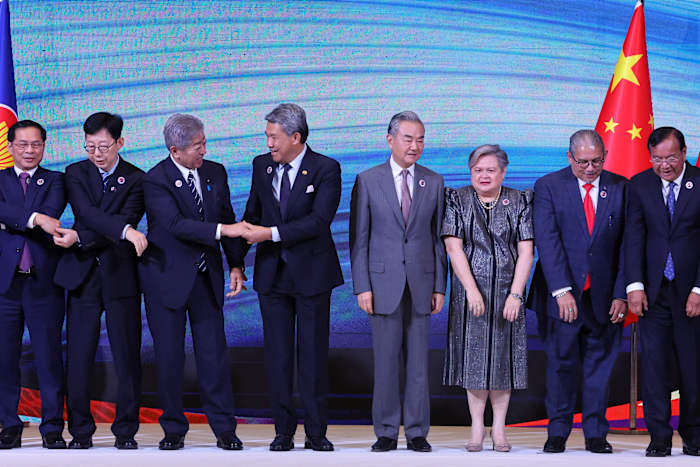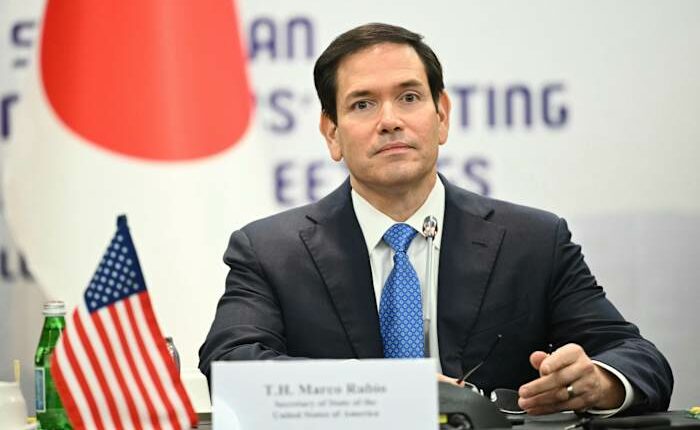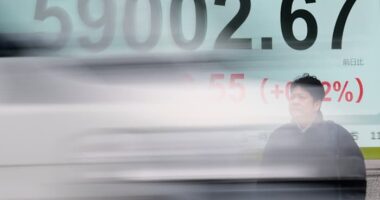Share this @internewscast.com

KUALA LUMPUR – U.S. Secretary of State Marco Rubio is concluding his second and final day at a Southeast Asian security conference, focusing on a crucial meeting with China’s foreign minister amid rising tensions between Washington and Beijing. The issues under discussion range from trade disputes to security matters and China’s backing of Russia’s conflict in Ukraine.
Following discussions with various regional nations at the Association of Southeast Asian Nations forum in Malaysia, Rubio is set to wrap up his first official visit to Asia with face-to-face conversations with Chinese Foreign Minister Wang Yi on Friday, according to the U.S. State Department.
This meeting takes place less than a day after Rubio’s encounter in Kuala Lumpur with Russian Foreign Minister Sergey Lavrov, during which they explored potential strategies to revive peace talks concerning Ukraine.
The meetings come against a backdrop of global and regional unease over U.S. policies, notably on trade and large tariffs that U.S. President Donald Trump has threatened to impose on friend and foe alike.
While Rubio heard complaints about the tariffs from his Southeast Asian counterparts, he told reporters Thursday that many of them focused their discussion on security issues, their concerns about Chinese domination and desire for cooperation with the U.S.
“Of course, it’s raised. It’s an issue,” he said. “But I wouldn’t say it solely defines our relationship with many of these countries. There are a lot of other issues that we work together on, and I think there was great enthusiasm that we were here and that we’re a part of this.”
However, Trump sees China as the biggest threat to the United States in multiple fields, not least technology and trade, and like previous U.S. presidents has watched the country greatly expand its influence globally while turning increasingly assertive in the Indo-Pacific, notably toward its small neighbors over the South China Sea and Taiwan.
Trump has warned of massive tariffs that he could impose on Chinese exports to the United States and preliminary discussions between the two sides have yet to produce significant progress.
Since former President Joe Biden was in office, the U.S. has also accused China of assisting Russia in rebuilding its military industrial sector to help it execute its war against Ukraine. Rubio said the Trump administration shares that view.
“I think the Chinese clearly have been supportive of the Russian effort, and I think that generally they’ve been willing to help them as much as they can without getting caught,” Rubio said Thursday, suggesting the topic would be discussed if he and Wang met.
Rubio and Wang have been shadow boxing during the two-day ASEAN meeting with each touting the benefits of their countries’ partnerships with Southeast Asian nations.
While Rubio has played up cooperation with the U.S., signing a civil-nuclear cooperation agreement with Malaysia for instance, Wang has railed against Trump’s threatened tariffs, notably against almost all of ASEAN’s 10 member states, calling them an abuse and an attempt to subvert free and open trade and a danger to global financial stability.
While noting an overall “positive” situation in East Asia, in his discussions with Southeast Asian foreign ministers, Wang warned of growing challenges brought by “unilateral protectionism and the arbitrary imposition of tariffs by certain major powers.”
On Thursday, Wang and Lavrov met and delivered a subtle but unmistakable warning to the United States over Southeast Asia.
“Russia and China both support ASEAN’s central role in regional cooperation, are committed to maintaining peace and stability in the Asia-Pacific region, and are wary of certain major powers creating divisions and instigating confrontation in the region,” they said, according to Russia’s foreign ministry.
Copyright 2025 The Associated Press. All rights reserved. This material may not be published, broadcast, rewritten or redistributed without permission.












